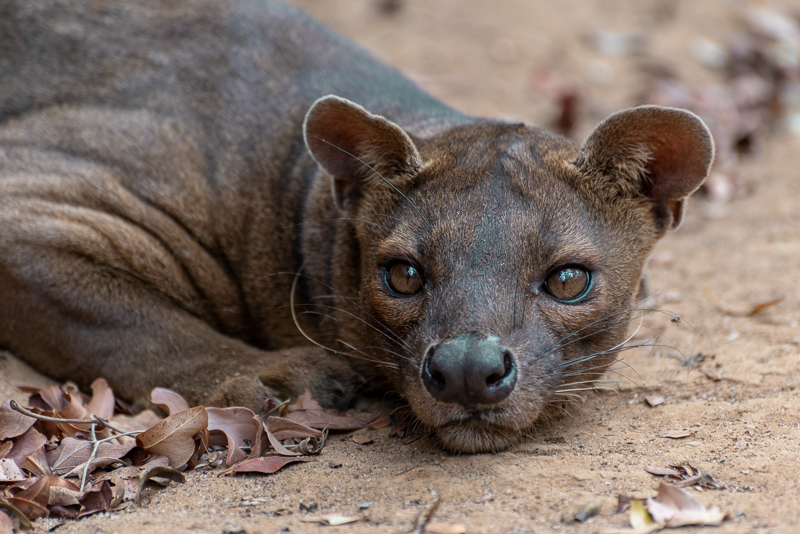Meet a NatGeo Explorer: Whiteville museum hosts virtual Teen Science Café March 19
For immediate release ‐ March 16, 2021
Contact: Brian Wuertz, 910.788.5100. Images available upon request

[WHITEVILLE, N.C.] – Calling all teens! Tune in to the latest Teen Science Café, hosted by the North Carolina Museum of Natural Sciences at Whiteville, to hear from National Geographic Explorer Luke Dollar. During this free, virtual event — held Friday, March 19 at 6 p.m. — Dollar will share stories from more than two decades of fieldwork, conservation and education in Africa and the United States.
Dollar’s research focuses on predators ranging from big cats to Madagascar’s largest carnivore, the fosa (pictured). More than half of his efforts, however, are concentrated on education and employment programs for people sharing space with Africa’s predators. Dollar’s research has not only yielded an incredible amount of data on carnivore biology and behavior, but his programs have led to the development of scholastic and business programs benefiting thousands of local farmers and their children.
He served as program director for National Geographic’s Big Cats Initiative from 2009 to 2017 and is currently Bashore Distinguished Professor and Chair of the Department of Environment and Sustainability at Catawba College and Adjunct Professor at Duke University. The son of two teachers, Dollar grew up in the 1970s and ‘80s in the rural South with loves of both the classroom and the outdoors and is happiest when both come together.
Register for the program here, or you can find more information about the Teen Science Cafés at Whiteville on the program Facebook page: facebook.com/teensciencecafewhiteville.
Teen Science Cafés offer an informal setting for teens to learn about STEAM (science, technology, engineering, arts and mathematics). Each Café features a professional speaking on a topic chosen by teens who enjoy science. Cafés are held the third Friday of the month, 5–6:30pm, September–May. Free.
About the NC Museum of Natural Sciences
The North Carolina Museum of Natural Sciences in downtown Raleigh (11 and 121 W. Jones St.) is an active research institution that engages visitors of every age and stage of learning in the wonders of science and the natural world. In addition to two downtown buildings showcasing seven floors of world class exhibits, the Museum runs Prairie Ridge Ecostation, a 45-acre outdoor education and research facility in west Raleigh, as well as satellite facilities in Whiteville, Greenville and Contentnea Creek. Together, our mission is “to illuminate the natural world and inspire its conservation.” Downtown Raleigh Hours: Tuesday–Sunday, 10 a.m.–4 p.m. General admission is free. For more information, visit www.naturalsciences.org.
About the North Carolina Department of Natural and Cultural Resources
The N.C. Department of Natural and Cultural Resources (NCDNCR) is the state agency with a vision to be the leader in using the state’s natural and cultural resources to build the social, cultural, educational and economic future of North Carolina. NCDNCR’s mission is to improve the quality of life in our state by creating opportunities to experience excellence in the arts, history, libraries and nature in North Carolina by stimulating learning, inspiring creativity, preserving the state’s history, conserving the state’s natural heritage, encouraging recreation and cultural tourism, and promoting economic development.
NCDNCR includes 27 historic sites, seven history museums, two art museums, two science museums, three aquariums and Jennette’s Pier, 39 state parks and recreation areas, the N.C. Zoo, the nation’s first state-supported Symphony Orchestra, the State Library, the State Archives, the N.C. Arts Council, State Preservation Office and the Office of State Archaeology, along with the Division of Land and Water Stewardship. For more information, please visit www.ncdcr.gov.

